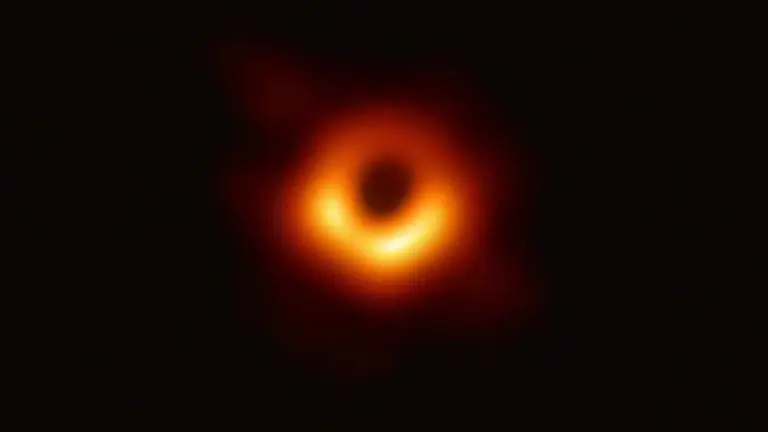Advertisement
Updated April 10th 2022, 20:47 IST
OTD in 2019: Revisit the photo-release of 1st directly imaged supermassive black hole
Located at the center of the Messier 87 galaxy, the supermassive black hole resides 55 million light-years and is 6.5 billion times more massive than the sun.

It was on this day in 2019, when the international collaboration between the European Southern Observatory (ESO), ALMA and APEX fructified to produce the first-ever directed photograph of a supermassive black hole. Located at the center of the Messier 87 galaxy, the supermassive black hole resides 55 million light-years from Earth and has a mass 6.5 billion times that of the Sun. According to the ESO, the black hole was photographed using the Event Horizon Telescope (EHT)-- a planet-scale array of eight ground-based radio telescopes-- and the breakthrough was announced in a series of six papers published in The Astrophysical Journal Letters.
Three years ago today, the first direct visual evidence of a supermassive black hole was unveiled. It was captured by the Event Horizon Telescope — a planet-scale array of ground-based radio telescopes that included our @ALMAObs and APEX telescopes.
— ESO (@ESO) April 10, 2022
🔗 https://t.co/HKGF6eG4ru pic.twitter.com/OV93IfAEZ8
The astronomers were able to have a relatively clear look at the black hole using a technique called very-long-baseline interferometry (VLBI). It is a technique that synchronises telescope facilities around the world and exploits the rotation of our planet to form one huge Earth-size telescope. Interestingly, this technique allowed a resolution clear enough to read a newspaper in New York from a cafe in Paris.
Over 200 hundred researchers overcome the formidable challenge
"We have taken the first picture of a black hole. This is an extraordinary scientific feat accomplished by a team of more than 200 researchers", these were the words of EHT project director Sheperd S. Doeleman of the Center for Astrophysics- Harvard & Smithsonian. Photographing the supermassive black hole was a formidable challenge for the astronomers since they had to upgrade and connect a worldwide network of eight pre-existing telescopes deployed at difficult high-altitude locations.
Paul T.P. Ho, EHT Board member had said in an ESO statement, "Once we were sure we had imaged the shadow, we could compare our observations to extensive computer models that include the physics of warped space, superheated matter and strong magnetic fields. Many of the features of the observed image match our theoretical understanding surprisingly well".
As for measuring the mass of the supermassive black hole, the astronomers said that they were able to do so by studying the bright area around it. They explained that a black hole creates a dark region similar to a shadow when immersed in a bright region, like a disc of glowing gas. "This shadow, caused by the gravitational bending and capture of light by the event horizon, reveals a lot about the nature of these fascinating objects and has allowed us to measure the enormous mass of M87’s black hole", astronomer Heino Falcke of Radboud University said.
Published April 10th 2022, 20:47 IST
